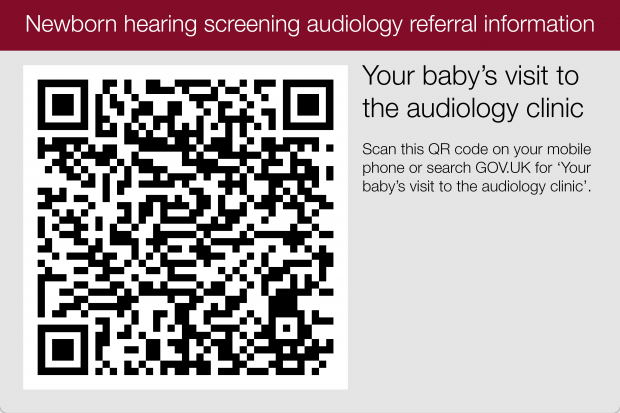We have published a new animation to support parents whose babies are referred for audiological testing after NHS newborn hearing screening tests.
Early identification and management of deafness gives babies a better chance of developing language, speech, communication and social skills. If a deafness is diagnosed, timely management and support can be offered.
The animation, embedded in the Your baby’s visit to the audiology clinic digital information on GOV.UK, prepares parents for what they can expect at an audiology appointment. It is also available with subtitles and other languages, including British Sign Language (BSL).
The animation continues the journey of Katie and baby Thomas from the NHS Newborn Hearing Screening Programme (NHSP) specific animation.
Why audiology attendance is so important
Newborn hearing screeners play a vital role in supporting audiological appointment attendance. An important element of this role is explaining the screening process and potential screen outcomes and not overly reassuring parents. About 1 in 15 babies tested at audiology clinics have a permanent hearing loss in one or both ears, so it is essential that parents understand that their baby could have a deafness.
The newborn hearing screen is highly effective in identifying babies who need further testing in audiology. Each week in England:
- more than 11,000 babies are screened
- about 270 are referred to audiology
- approximately 21 babies are diagnosed with a permanent childhood deafness
Audiology assessments are time critical because they can be difficult to perform on older babies. If a deafness is identified then other tests may be required to find the possible cause. These tests need to be performed within the first few weeks of birth. However, only about 90% (9 in 10) of babies referred for further tests attend their audiology appointment within 4 weeks of screen completion.
Being able to direct parents to this new animation will help screeners to reinforce the importance of early attendance at audiology appointments.

How we developed the animation
We actively listened to parents to get their views and gathered comments from experts in screening and audiology to make sure the animation is of high quality and meets the needs of users.
This collaborative process included 2 online focus groups and has resulted in an excellent resource. One parent commented that it is “clear, simple, colourful, inclusive and to the point”.
The development process involved:
- senior paediatric audiological experts
- parents
- the National Deaf Children’s Society (NDCS)
- members of the PHE national NHSP programme team and the information and education for public and professional (IEPP) team
- a highly experienced production company with a strong background in healthcare
The parent focus group consisted of 6 parents, 4 of whom had babies referred from the screen to audiology for further tests, including one parent who had a close family history of deafness. All 4 babies were found to have satisfactory hearing and were discharged from audiology.
The babies of the other 2 parents had been discharged from the newborn hearing screen.
Positive feedback
We asked focus group participants to rate different aspects of the animation on a scale of 1 (very poor) to 10 (excellent). Experts and parents both scored it very highly in terms of the visuals, messages and support for parents to attend the appointment.
Comments from the parents included:
Strikes the right chord.
Gives what you need to know.
Easy to understand.
Enjoyed it – clear, simple, colourful, inclusive and to the point.
Thank you to everyone who participated in this process. The focus group was an excellent way to listen to parents’ experiences of screening and audiology assessments. We were able to learn from them and pass on specific helpful feedback to the local services involved.
PHE Screening blog
The PHE Screening blog provides up to date news from all NHS screening programmes. You can register to receive updates direct to your inbox, so there’s no need to keep checking for new blogs. If you have any questions about this blog article, or about population screening in England, please contact the PHE screening helpdesk.